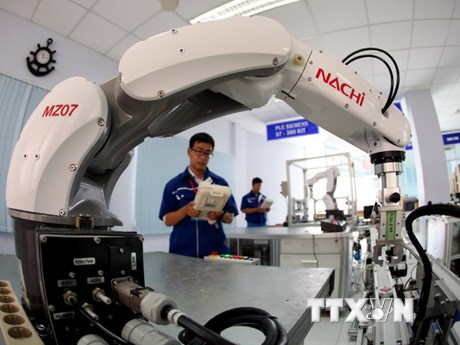The heavy impacts of the COVID-19 pandemic on the domestic and global economies were requiring firms to reshape their production and business strategies as well as their competition models to increase resillience against the external shock.

The heavy impacts of the COVID-19 pandemic on the domestic and global economies were requiring firms to reshape their production and business strategies as well as their competition models to increase resilience against external shocks.
Economist Can Van Luc said that in the pandemic, investments tended to flow into safe investment channels such as gold which saw prices increase by around 20 per cent in the global market and US Government’s bonds.
There was also a wave of merger and acquisition (M&A), Luc said. Other emerging trends were the move to cut costs and jobs, restructuring the supply chains and investment flow shift.
“The pandemic was forcing enterprises to rethink the way they work and create impetus for digital transformation. Moreover, consumer psychology and behaviour were changing, requiring firms to reshape their ways of providing products and services,” Luc said.
“We must have solutions to cope with the current situation. We must recover as quickly as possible. And we must renovate our business strategy,” he stressed, adding that restructuring was vital to increase the ability to cope with external shocks.
Although 2020 would be an extremely difficult year, firms should focus on talents and technology breakthroughs to develop, Luc said.
According to Hoang Duc Hung, deputy director general of PwC Viet Nam, enterprises must focus on promoting digital transformation and renovating technologies to improve capacity and optimise their internal management efficiency.
Hung said that at this moment, enterprises still needed the Government’s support in transforming their business models with efficiency.
He added that policies to enable Vietnamese firms to participate in value chains were also essential.
Director of the Institute for Brand and Competitiveness Strategy Vo Tri Thanh said that the Government should consider new stimulus packages which aimed at enhancing the corporate governance capacity and resistance against shocks.
Besides, the continued efforts in administrative reforms and improving the business climate and market transparency was of critical importance, Thanh said.
“This crisis has upset past beliefs and models of costs… As Viet Nam settles into this new normal of “business as usual”, leaders must continue to balance between cutting costs in a way that doesn’t harm the business while redirecting costs to the drivers of growth,” a recent report themed Reshare Your Business for Growth by PwC wrote.
“In order to prepare for future shocks, it is time to revisit strategic priorities, look for what is different in the value chain and bring your people with you into the new way of operating.” — VNS





